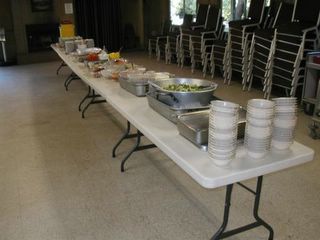Food is a means to the end, not the end in itself
Unless you're running a camp for Chef Emeril, you mission is to feed nourishing meals to the campers. Nothing more. I say this because there's the temptation to place too much emphasis on food and how it's served. Most children will appreciate plenty of food served in simple meals.
The kitchen must support the camp's mission, which in our case was to present the word of God to campers, provide fellowship among campers who come from a number of local churches in Northern California and to foster lifelong friendships. This takes constant coordination with the camp's director (or co-directors in our case). The kitchen must always be ready to accommodate minor schedule changes and to support feeding changes (within reason).

The salad bar. We served an extensive selection of salads and all the fixin's at lunch and dinner. Most salads are made in small quantities, 25 to 50 portions for a population of 150. The salad bar is there to offer variety and an alternative to those who don't like the main meal.


No comments:
Post a Comment